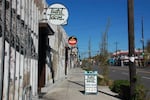On March 17, Portland landlord and developer Kevin Cavenaugh emailed the 32 restaurants and retailers leasing space from him. Two lines stood out in bold:
“We are all in this together.”
“Rent will not be due in April.”
Then he emailed dozens of more tenants and said, for April, pay what you can.
“Please don’t take my kindness for weakness,” he said a few weeks later, sitting in the empty food court of The Zipper, his triangle of a building on Northeast Sandy Blvd. “This is a deep study in human nature. Every dollar you don’t pay me is a dollar I fall into the hole. But I trust you."

The Zipper on Northeast Sandy Blvd in Portland, April 16, 2020
Kate Davidson / OPB
As the coronavirus pandemic ravages the economy, destroying tens of millions of American jobs, governments in Oregon and Washington have tried to slow the carnage by imposing moratoriums on commercial and residential evictions. But absent private negotiations with landlords, who may themselves owe banks, the day will come when unpaid rent is due, possibly during a severe recession.
Some commercial landlords have responded to requests for accommodation with silence. At The Zipper, the landlord took a different view of his building’s economic food chain. That’s had a ripple effect from workers at the bottom to investors at the top.
Bottom rung: the workers
The Zipper is a funky, single-story building at a triangular intersection once occupied by a used car lot. Its central common area is ringed by a coffee shop, a full bar and four micro restaurants: Slice Pizza; Basilisk for fried chicken; Sari Ramyun for Korean ramen; and Tight Tacos, which is still open for takeout and delivery during the statewide shutdown.

At The Zipper, Tight Tacos is still serving to go orders during the pandemic.
David Stuckey / OPB
In mid-March, the restaurants braced for disaster. Oregon Gov. Kate Brown was on the brink of banning people from eating and drinking on site.
“I just had this feeling that something big was about to hit,” said Whitney Delk, the bar manager at Paydirt. “This tidal wave.”
She ran into one of the bar’s owners, Ezra Caraeff.
“He looked like a president that had served two terms,” she said. “I was just like, ‘What’s going on?’ and he pulled us outside and told us that they would be closing the bars the next day.”
On March 16, Brown gave her order.
On March 17, landlord Kevin Cavenaugh sent his email to The Zipper’s tenants, forgiving April rent.
It was an immense relief to the business owners, but for most workers, it couldn’t turn back the tsunami. Several of the building’s restaurants laid off staff quickly, trying to help them beat the rush of unemployment claims.
That didn’t always work.
With no computer, Paydirt bartender Ray Vigil struggled to file for unemployment on his phone. He planned to travel to Utah to help care for his mother, who he described as immunocompromised.
He got sick on the drive.
Related: Q&A: Getting To The Bottom Of Oregon’s Unemployment Delays
“Super lethargic,” said the 30-year old. “Sore throat and all that.”
He holed up in an RV. The Utah night fell to 13 degrees. He saw his mom from a distance, signed up for food stamps, got a drive-through coronavirus test and waited for the results. He worried about money. Felt restless. Depressed.
“I’m filled with anxiety. Like, so much. I want something to happen,” he said by phone from Utah. “I want to go back home.”
In Portland, Whitney Delk struggled with Oregon’s outdated and overloaded unemployment system.
“The website keeps changing what it’s telling me,” she said. “It says it’s processed. It says it’s received and then it says there’s no claim on file. It’s just kind of all up in the air.”
By April 20, she still had no clarity on the claim she filed March 31.

Since Paydirt bar manager Whitney Delk was laid off from her job in The Zipper, she's been taking pictures, including this self-portrait.
Whitney Delk
She also found herself alone, mourning the job she loved and not thinking about her $45,000 in student loans.
“I feel like every day it gets more eerily quiet,” she said. “I saw a kid squirting a water gun into the concrete wall the other day. He didn’t have anyone to play with. I was like, ‘I feel you.’”
A silver lining appeared for at least one of the laid-off workers. Basilisk line cook Andrew Smith had been balancing work and school when the pandemic took his job. Suddenly, he had time to study. And with an extra $600 per week in enhanced unemployment benefits from the federal government, he began making more money, jobless, than he had in the service industry.
“If you take the whole deadly virus thing out of it, I’m doing pretty good,” he said.
In the RV in Utah, bartender Ray Vigil got his COVID-19 test results: negative. He packed for Portland.
Middle rung: the businesses
By mid-April, the only buzz of activity at The Zipper came from Tight Tacos’ kitchen. Two people fit. Three max. Running lean meant layoffs.

Tight Tacos co-owner Annamarie Cosio stands at the door to their space in The Zipper in Northeast Portland on April 16, 2020. The restaurant stayed open for takeout and delivery.
Kate Davidson / OPB
“Our internal battle was: If we close, when do we open? If ever? Closing and reopening would be harder,” said co-owner Mark Cosio. “If unemployment is gonna be so good, how are we gonna find employees to actually work?”
Over at the bar, Paydirt, the doors were barricaded shut with empty kegs and metal s'mores sticks.
“Every day when I walk into a bar that’s completely empty and looks like this bar, it physically hurts me,” said co-owner Ezra Caraeff. “And I do it four times a day.”
Most of the business owners in The Zipper have more than one location. So as revenue tanked in March, difficult conversations about layoffs and rent multiplied.
“We’re entirely at the mercy of our landlords and the federal government at this point,” said Caraeff. “We have four different places, four very different landlords with different personalities and probably different financial situations."

Ezra Caraeff, co-owner of the bar Paydirt in The Zipper, on April 14, 2020. "We’re entirely at the mercy of our landlords and the federal government at this point," he said.
Kate Davidson / OPB
Some, he said, had been candid and generous. One volunteered to apply a prepaid security deposit toward rent instead.
“We find others that have been pretty distant, which doesn't feel like a coincidence during this time,” he said. “It feels very much like, Hey, if we don't answer those emails, you still have to pay us rent. ”
Related: Why Insurers Won't Cover Businesses' Coronavirus Losses
On March 17, Tommy Shin got the email from The Zipper’s landlord, saying his April rent was forgiven.
He was shocked.
“I was inspired by that, so I decided to remain open for my workers to support them too,” he said.
He closed Sari, his Korean ramen restaurant in The Zipper, and laid off workers. But he kept three other kitchens open, with minimal staffing, for the sake of several cooks who feared their visa status made them ineligible for unemployment.
“We are barely surviving,” Shin said.
There’s a common refrain up and down the economic food chain at The Zipper: If the restaurant shutdown goes on for a couple of months, it’s one thing. Six months is another.
“The thing that I worry about the most is if we reopen again and then nobody shows up,” said Basilisk owner Jason Myers, who laid off his staff of 10. “And then I have to lay people off … again. I think that will be the most heartbreaking thing."

Jason Myers, owner of Basilisk, outside his shuttered restaurant at The Zipper on April 10, 2020. He worried about reopening to tepid business and having to lay off staff again.
Kate Davidson / OPB
“What does our world look like after all of this?” asked Tight Tacos co-owner Mark Cosio. What will become of social gatherings? “Cause everything's obviously gonna change."
The owner of Slice, the pizza place, took a more sanguine view.
Randy Swerdlick pointed to planned development in the neighborhood around Northeast Sandy Blvd. and the prospect of years’ worth of hungry construction workers. Plus, he had his other business to fall back on — The Jewelry Buyer down the street.
“In 2008 when the recession hit, we’d come to work and there was people standing in line to come in,” he said. “People are gonna start selling their jewelry and gold to make ends meet.”
“I don’t like doing business like that, but we’re a necessary evil, I guess.”
The experiment at the top
When landlord Kevin Cavenaugh sent his “rent forgiveness” email to The Zipper’s restaurants on March 17, he was thinking long term.
“I don't care who pays me rent in April. I care who pays me rent next April,” he said.

Developer and landlord Kevin Cavenaugh sits in the empty food court of The Zipper on April 10, 2020. “I don’t care who pays me rent in April. I care who pays me rent next April,” he said.
David Stuckey / OPB
Cavenaugh is an unusual landlord — an architect-turned-developer who retains partial ownership of his buildings. His company, Guerrilla Development, is responsible for some of Portland’s most striking facades, including The Fair-Haired Dumbbell.
After sending the email, Cavenaugh said he called his bank and asked for a three-month pause on The Zipper’s mortgage payments. To his delight, he got six. The lender, First Republic Bank, declined to comment. First Republic is a publicly-traded bank, with a responsibility to its shareholders as well as its clients. Its loans totaled roughly $95 billion at the end of March.
Related: Northwest Businesses Fight Confusion And The Clock To Get Emergency Loans
Cavenaugh’s rent plan for May:
“Same.”
June:
“Same.”
July:
“Same."
For him, commercial real estate is a long game. If his tenants survive, they can continue cutting the rent checks that pay bank loans and investors.
“If a tenant is on the ledge, I don’t want to be the person shoving them off,” he said. “And I think the way that we all act now, people in my position, could have beneficial effects or dire effects.”
He doesn’t know how long his experiment can last.
“All it takes is a bank or an investor or anyone else in the food chain making problems and then all of a sudden I’m spending my time dealing with them and that likely will have a ripple effect,” he said.

The Zipper building stands largely empty on a beautiful spring day, with most restaurants closed during the coronavirus pandemic.
David Stuckey / OPB
In mid-April, the Zipper’s investors appeared to be on board, including Ted Labbe, who has invested in a number of Guerrilla Development projects. He and his brother Jim each put $100,000 into The Zipper. After bank payments, they’re paid quarterly profits from the tenants’ rent. No rent means no payments — at least for now.
“It starts to add up, and if it went on for longer, I would really start to hurt,” he said. “But if it's for a couple months, hell yeah. I can do that. I want to do that.”
Labbe is a wealthy investor — he comes from an old flour-milling family — but he’s an ecologist by training. For him, the idea of perpetual growth is a myth when it comes to economic ecosystems such as The Zipper.
“Ecosystems don't grow perpetually,” he said. “There are periodic disturbances. There's fires. There's floods. Systems reset. They recalibrate and, if they're resilient, they bounce back from catastrophes or disturbance.”
Cavenaugh was happy with his 91 tenants’ response to April’s rent experiment, in which non-restaurant tenants in other buildings paid what they could. But the drop in revenue meant temporarily cutting his own staff’s pay in half. He planned to use a forgivable loan from the federal government’s Paycheck Protection Program to restore them to three-quarters time and pay.

Herman Jolly stands in the empty food court of The Zipper in Northeast Portland on April 10, 2020. "I’m always looking for the bright spots," he said. "I’m just lucky I have some."
Kate Davidson / OPB
In the meantime, employee Herman Jolly felt grateful. He was about to tape-off the unused bathrooms in the almost-empty Zipper, part of his job taking care of Cavenaugh’s buildings. His parents had stepped in to help with his house payments.
“I have a lot of medical bills,” said the 50-year-old asset manager. “My son has leukemia. I blow through all the maximum out-of-pockets, like, instantly.”
His wife, a preschool teacher, left her job to avoid bringing home germs. Jolly felt lucky the coronavirus pandemic didn't hit last year, when his teenager underwent grueling treatment.
“I’m always looking for the bright spots. I’m just lucky I have some. If you work there,” he said, pointing at an empty restaurant, “you don’t have any work.”
On Thursday, Sari Ramyun quietly reopened in The Zipper. By 5 pm, a few customers had showed up for takeout.
